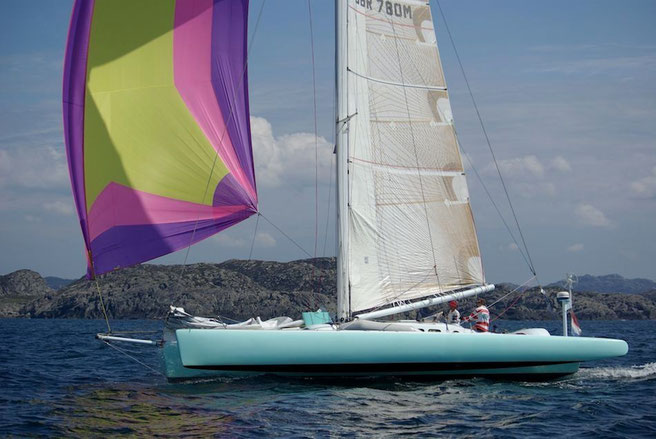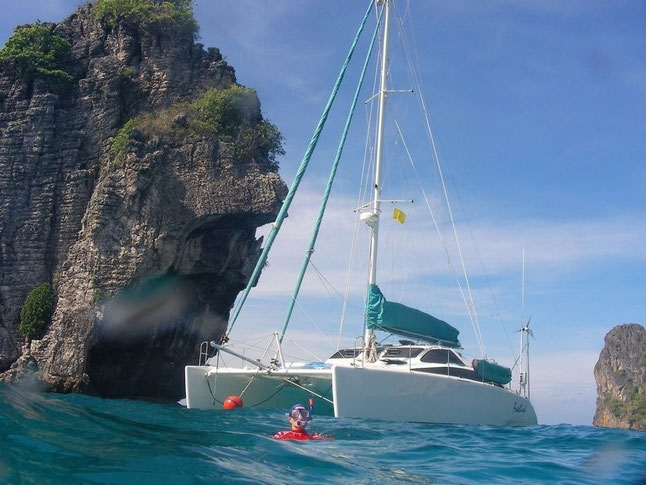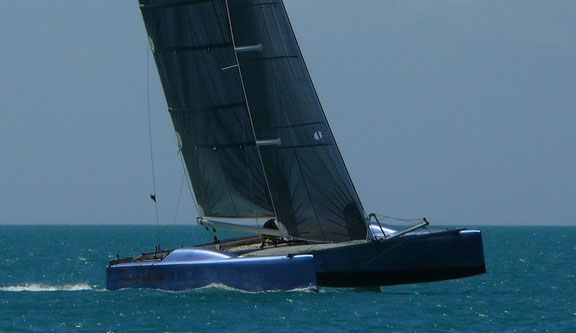Back Pages
An overview of some of the designs I've created beginning with Born to Run in 1986. If you don't see your boat and have a good picture on offer; drop me a line and I would be happy to include it on the page.
Tony Grainger

Born to Run was the first Grainger design, launched in January 1986. I called the design the 075 because it was originally 7.5m long, but I extended it to 8m during the build process.
Born to Run attracted a lot of attention with her performance at Hamilton Island Race Week that year and was instrumental in inspiring a host of new trimaran designs.
I lofted the lines full size in the back yard on sheets of chip board (pre MDF and computers). I was lucky to get the loftings done before rain destroyed the chip board and the lines were lost.
The Spoon Bay 10.6 (36') trimaran was either design #2 or#3 in 1986 alongside the 10.6m cat Alfresco 1060. The two boats were designed concurrently and it didn't seem too important to allocate design numbers at that stage.
The photo here is of Voodoo, built in strip plank cedar and competitively raced under the command of Bob Hutchings.
Another of the spoon Bay trimarans that is well known is Steve Soden's Rock Lobster. Steve invited me to sail with him to Vanuatu and we surfed dream quality lefts at Dunbier Pass while anchored behind the reef in a world of our own. A great memory!
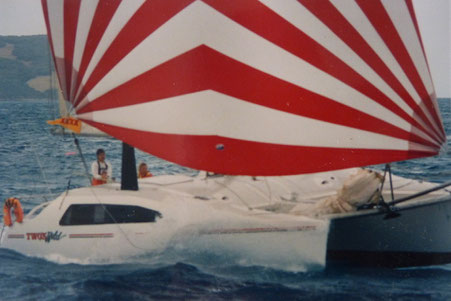

The Alfresco 1060 was designed concurrent to the Spoon Bay 10.6 in 1986 but regretfully no photos remain. This is the Alfresco 920 Two's Wild, a smaller version of the 1060 and quite a pleasing design in my view.
It was built by the Schionnings when they were based in Mackay in Central Queensland.
It's an open wing cat with the cabins cantilevered over the wing.
Several of the 920 and the 1060 were built but I became frustrated that the owners later added fully enclosed hard top cabins to the wingdeck, not always very tastefully executed.
It seemed to make sense to just design the boats with a fixed deck cabin from the start.


ATL/Riverside Oaks was one of the boats inspired by Born to Run and she put on a similarly impressive performance at Hammo in 1987 under the command of Graeme Bird.
Oaks was built to the trailer yacht regulations of the time which included a headroom requirement for the accommodation. The interior was immaculately laminated in timber veneers by Kiwi builder Neil Devril but very few people got to see the inside because access was not easy.
The deck layout was done by 18' skiff champion Rob Brown.
Interesting to note the bow pole - while Born to Run in the top image still has a mast mounted spinnaker pole.
Was this the first Grainger design to sport a prodder?

The Ocean Sports 11 was one of the first sports cats from Grainger Designs. It was created in 1991. This example was built in Northern Queensland and recently had a major refit and new paint job by Warren Innes. The boat is named Barefoot - not to be confused with our Barefoot model range. Great photo by Julie Geldard.
ALFRESCO 430 BOSSANOVA

Alfresco 430
No records of this design can be found apart from a few study plans in pdf format, but it was a 43' version of the Alfresco cats built in New Zealand by Nick Beadle and delivered to Antwerp for charter work. It would have been designed some time in the early to mid 1990's.








MTB 920

The MTB 920 was designed around 1989/90 and two notable examples include Mad Dog's Tip Truck and Akimbo shown here racing in the Brisbane to Gladstone Race. The photo on the left is by Julie Geldard. This was another hand drawn design.
TR40 TRIMARAN
The TR40 trimaran was design number 30 created in 1991 with computer software for the surface modelling and drafting work. It is one of just a few of the early designs I still have most of the files for, although many of them can no longer be opened because of software revisions over the years.
The TR40 was very much my own dream boat. Just a few were built and notable examples include Gleam in the UK and Yana shown in this photo. Yana was built at Rhebergens yard in Amsterdam and has voyaged extensively including two transatlantic crossings.
The new TR42 design is an up to date redraw of this concept.
OCEAN EMU
Ocean Emu was designed for Peter Claringbold in 1988 and was one of the last boats I drew by hand before computer modelling became easily accessible.
She showed great promise in early racing but suffered 2 major structural failures forcing a much more rigorous and analytical approach to engineering design for future projects.
Ocean Emu was eventually rebuilt and is now based on the Queensland Sunshine Coast.

Ocean Emu racing at Hamilton Island Race Week 2015
075 MK11
075 Mk2 Consider Me Gone
In the early 1990's I drew a Mark2 version of the 075 with new float shapes and the aft beam moved aft to the back of the cockpit. This one was nicely built by Doug Fuller in strip plank cedar. We raced it in the Australian Trailerable Championships at Wangi in 1991.
Chincogan 40
Chincogan 40 was designed in the early 1990's (possibly 1993) and was the first of two production cats I designed for Chincogan Catamarans.
It was successful at a high performance cruiser and in one case a day charter boat. Chincogan Catamarans built about 12 examples of this design before tooling up for the Chincogan 52.
The boat in the photo is Steve Soden's Captain Jack, a regular visitor to the enticing waters of Laem Promthep in Thailand.


TR10
This 10m LOA fixed beam trimaran was designed for a Dutch client in 1994 and built at the Rhebergen yard in Amsterdam.
It had fixed beams and was intended for cruising in Northern European waters.
Thanks to Trijnie Dijkhuis for the photos.
The Mystery Cove 42 was designed in 1994 and this example was built by Dave Howell in Seattle.
Several Grainger designs have completed circumnavigations and that was Dave and Judy's intention too. They cruised for several years in the Pacific, and in Asian waters, sometimes going back on their tracks to revisit favoured cruising haunts.
Dave and Judy probably covered as many or more miles than many people who have competed circumnavigations.
They eventually sold Free Bird in the Mediterranean.
Thanks Dave for the photo, It's one of my favourites.
Essential Eight
Gordon Myers had been inspired by Born to Run to build an 075 named Peregrine which he campaigned very successfully on the Australian racing circuit before building moulds for the Essential Eight. Several examples of this design were built and are still racing very competitively in Australian waters.
Gordon has been a leading figure in Australia's trailer yacht movement demonstrating exceptional sailing skills and always pushing the boundaries with design development.
I expect Bare Essentials might have been the first trimaran in Australia to fit C foils and a canting rig.

The Lightwave 38 was designed in 1995 and was the first of a series of production catamarans for Lightwave Yachts. That range now encompasses six models; the Lighwave 38 and
45 sailing cats, the Power 38 and 46, the motor sailer 47 and the Raider one design.
Over 100 of the 38's had been built at last count.


Originally designed for Tony Considine in 1995 Trilogy has had a very long and successful racing career under the command of Keith Glover and a very focused crew. Trilogy's titles include no less than six times winner of the Australian National Championships.


Three Chincogan 52's at Naiharn Beach in Thailand. Doug Fuller Photo
The Chincogan 52, design #92 was designed in the late 1990's as a second production boat for Chincogan Catamarans. This design became popular as a lightweight high performance cruiser ideal for western Pacific and Asian waters. Big enough to live aboard and yet athletic enough to chalk up impressive daily mileages, she developed a reputation as an excellent sea boat and great all round cruiser. The three boats photographed here in Thailand are Churakai, Catchus and Soul.


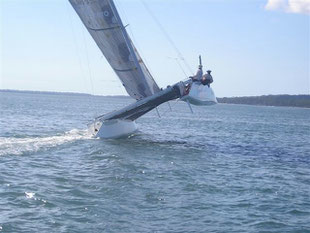
Daryl Dorset is a prolific builder of fast catamarans, both for himself and for others. This one is Carbon Copy, Design #101 which Daryl built for himself and is captured here racing in the Bay to Bay Race. I don't remember which year this was.
Gordon Myers had just crossed the line after the first day's racing and was stowing his sails as Darlyl came to the finish line showing some generous air under the windward hull. Gordon grabbed his camera and snapped off a series of shots including these three.


Design #98, a 48' cruising cat was designed for Brian and Ruth Coombes who built one for themselves and then went on to Build Dreamcatcher, shown here for Bruce Brockhoff. Several more boats to this design were built around the world.

Taeping was the 37' racing cat designed for George Owen. She was built in Queensland and the launch date was close to Brisbane to Gladstone Race time, so George decided to compete in the race as part of the delivery trip to Darwin.
Taeping was the line honours winner that year. She has since been sold to Dave Andrews and is based in Auckland where this photo was taken in 2014.

The Raider 30 was designed in 1999 developed from the lines of SilverRaider and built from production moulds.
A number of Raiders have been raced very competitively including Raider One Design and Allyacht Raider whose titles include a win in the Brisbane to Gladstone Race under the command of Joel Berg.
The photo to the right is by Julie Geldard.
Cut Loose was design #100 created in 1998. The brief was for a 40' cruising cat with 55' long hulls. There was to be no accommodation at all forward of the mast bulkhead. In fact there wasn't even any access through the mast BH. Cut Loose was one of the first designs in a trend towards long hulls with modest accommodation for effortless passage making.
She was built on the Queensland Gold Coast in strip cedar by Jamie Morris and was cruised extensively by her owners.
She is now based on Lord Howe Island and makes regular fast passages to Australia.

Flat Chat
This 40' racing catamaran was Design #104 built by Daryl Dorset. She had a very successful racing career under the command of Jamie Morris including twice taking line honours win in the Brisbane to Gladstone Race. She is now based in New Zealand.
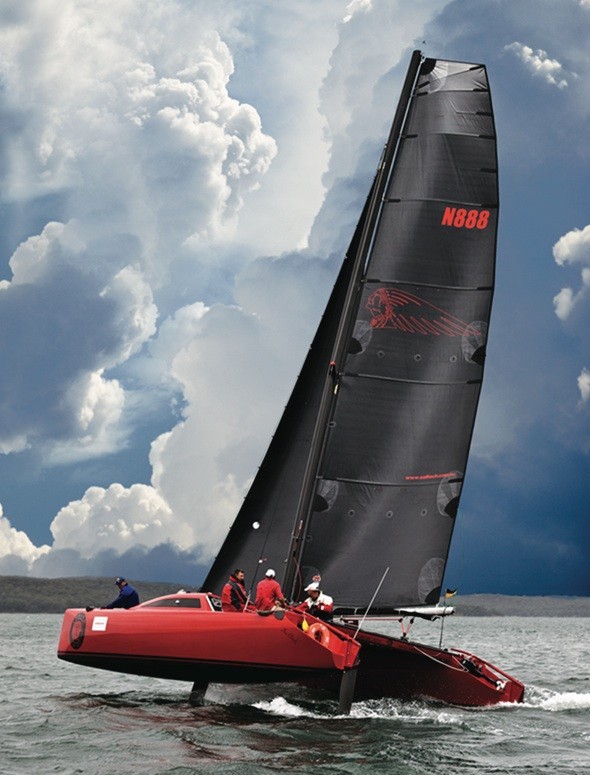
Indian Chief was built by Wayne Barret all in carbon fibre and using the Raider moulds. She had a very successful racing career firstly under Tony Considine and then under Darren Drew based on Pittwater in Sydney.
The photo was taken on Lake Macquarie by Peter Acheson

Mad Max was designed in 2000 and built by Daryl Dorset. She was originally known as Carbon Copy (see earlier entry) and she has had a very successful racing career under Tony Considine and his crew. She is still being actively campaigned on the Australian racing circuit and the photo here shows her on on track for another win in the Bay to Bay Race in 2014.
Photo courtesy Julie Geldard.


The middle period between 2000 and 2010 was a busy period for cruising cats in the 43' to 48' size range. Two examples are shown here; the 48'er Salanjo above and the 43'er Cat man Do at the right.
Some of the other boats designed in this period include the G485 cruising cat and the 45' sailing and motor cat designs for Lightwave Yachts
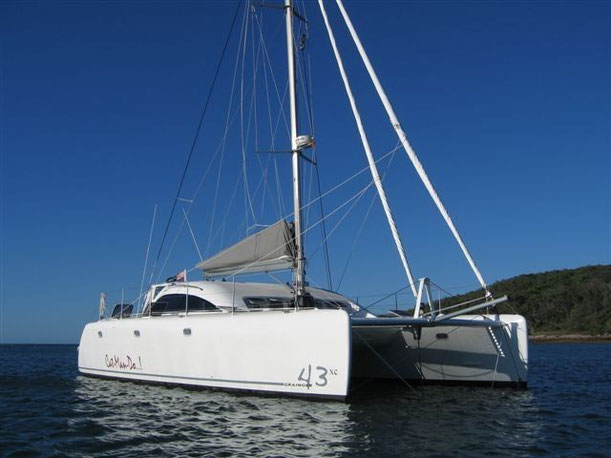
Cynophobe, Design #144, a 37' racing cat was designed in 2008 for a group of sailing enthusiasts based in Airlie Beach. The boat sailed very competitively in Central Queensland waters for several years and is now based on Pittwater in Sydney
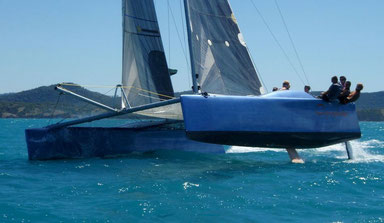
Barefoot 40 was Design #191 and was created in 2008/2009 in an effort to find a new direction and to relieve some of the "sameness", or dare I say "monotony" that had crept into the styling work, not just in my own work but in catamaran design in general.
This example, the Barefoot 40, was built in Thailand by Asia Catamarans. There is also a 45' model and both are available professionally built or in Duflex kit form.

Design 234 RAW30
This is the high performance version of the Design 234 originally created for Corsair. It uses the same hulls, beams and folding system, and hence keeps the same design number. Construction is all carbon. The rig and daggerboard are moved further aft, and the design features a sleeker cabin top.
Keep up with fresh ideas and inspired design from Grainger Designs. We won't bug you with a barrage of emails. Maximum of two per month.






